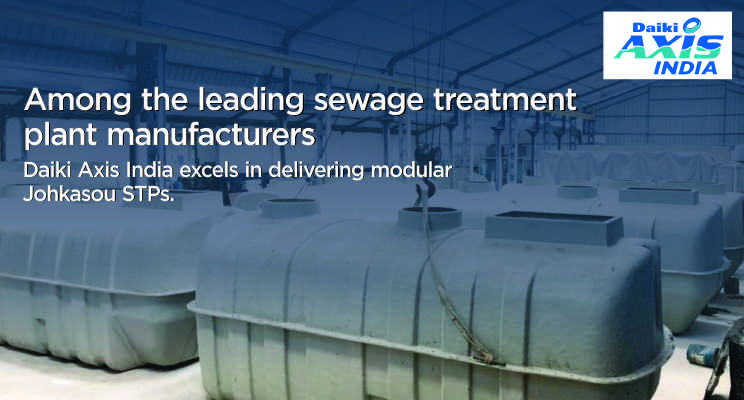As urban centres expand and industrial activities grow, effective wastewater management becomes increasingly critical. In India, where water scarcity and pollution are pressing issues, sewage treatment plants (STPs) are vital in ensuring environmental sustainability and public health. Among the key players of sewage treatment plant manufacturers is Daiki Axis India, which utilizes advanced technologies to address wastewater challenges. This article delves into the specific aspects of sewage treatment, focusing on Daiki Axis India’s contributions and the broader context of STP technologies.
Understanding the Basics of STPs
Sewage Treatment Plants (STPs) are engineered systems designed to treat wastewater and return it to the environment or recycle it for various uses. The STP process involves several stages:
- Screening: Large objects and debris are removed from the wastewater.
- Sedimentation: Suspended solids are settled out of the wastewater.
- Biological Treatment: Microorganisms break down organic matter.
- Disinfection: Pathogens are killed to ensure the safety of the treated water.
This process helps in reducing pollutants and pathogens, making water suitable for discharge or reuse.
Innovations in STP Technology
Recent advancements in STP technology aim to enhance efficiency, reduce environmental impact, and address space constraints. Here are some noteworthy innovations:
- Compact STPs: These systems are designed for areas with limited space. Daiki Axis India’s compact packaged STP exemplifies this approach, offering a solution that is both efficient and space-saving.
- Modular STPs: Modular systems are flexible and can be scaled according to needs. Modular sewage treatment plants can be easily expanded or reconfigured, making them suitable for varying capacities and applications.
- Decentralized Systems: Decentralized sewage treatment plants are ideal for locations where centralized infrastructure is impractical. Decentralized wastewater systems offer localized solutions, reducing the need for extensive sewer networks.
- Underground STPs: These systems are installed below ground to save space and minimize visual impact. Underground STP technology is particularly useful in urban settings where surface space is at a premium.
- Biofiltration and New Technologies: Advanced biofiltration technology and other new developments in STP technology, such as SBR STP (Sequencing Batch Reactor) and MBBR STP (Moving Bed Biofilm Reactor), improve treatment efficiency and water quality.
Daiki Axis India and Johkasou Technology
Daiki Axis India, a subsidiary of Daiki Axis Japan, brings innovative solutions to the Indian market with its Johkasou technology. Johkasou is a Japanese STP system known for its compact design and effectiveness in treating wastewater on-site. Here’s how Daiki Axis India applies Johkasou technology:
- Daiki Axis Wastewater Solutions: Daiki Axis India provides various solutions, including FRP sewage treatment plants, micro STPs, and readymade STPs. These solutions cater to different needs, from residential complexes to industrial facilities.
- Packaged Sewage Plants: The company offers packaged sewage treatment plants that are pre-engineered and ready for installation, simplifying the process of wastewater management.
- Faecal Sludge Treatment System (FSTP): Addressing the management of faecal sludge, Daiki Axis India’s FSTP solutions are crucial for sanitation in rural and underserved areas.
- Sustainable Water Management: Johkasou technology supports sustainable water management by treating and recycling wastewater, reducing the demand for fresh water and mitigating environmental impacts.
- Compact and Portable Solutions: Daiki Axis India’s compact STP and portable sewage treatment plants offer flexibility for various applications, from apartment complexes to temporary sites.
Addressing India’s Wastewater Challenges
India confronts major challenges in managing wastewater, including:
- Pollution Control: With rivers and water bodies suffering from pollution due to untreated sewage, effective STP solutions are necessary to meet Pollution Control Board standards and improve water quality.
- Water Scarcity: The country’s water scarcity issues are exacerbated by inefficient wastewater management. Water recycling and greywater treatment are essential for conserving water resources.
- Infrastructure Needs: Rapid urbanization requires robust infrastructure. Solutions like modular wastewater treatment and on-site sewage treatment plants help manage the growing demand efficiently.
- Regulatory Compliance: Compliance with regulations such as those set by the Central Pollution Control Board (CPCB) involves meeting specific PCB parameters for effluent quality.
The Role of Daiki Axis India
- Daiki Axis India: Part of Daiki Axis Japan, contributing to wastewater solutions in India.
- Focus Areas: Modular STP, FRP STP, and decentralized sewage treatment.
- Contribution: Addressing India’s need for flexible, efficient, and environmentally friendly wastewater solutions.
Conclusion
As India continues to grapple with the challenges of wastewater management, the role of STPs becomes increasingly important. Innovations in STP technology, such as those offered by Daiki Axis India, provide practical solutions for treating and recycling wastewater. By embracing advanced technologies like Johkasou, and focusing on sustainable water management, Daiki Axis India helps pave the way for a cleaner and more water-efficient future. Understanding and implementing these technologies is crucial for tackling water pollution, conserving resources, and ensuring a healthier environment.
Contact us at https://daikiaxis.in/contact-us/
Read more relevant blogs here: https://daikiaxis.in/blog/
#DaikiAxis #Johkasou #sewage #water #STP #DaikiSTP #WaterTreatmentProductsManufacturersinIndia
#PackagedSTP #JohkasouPrice #STPCompanies #STPPlant #SewageTreatmentPlantinDelhi #STPPlantManufactures #SewageTreatmentPlantManufacturesinIndia #johkasouSTP

